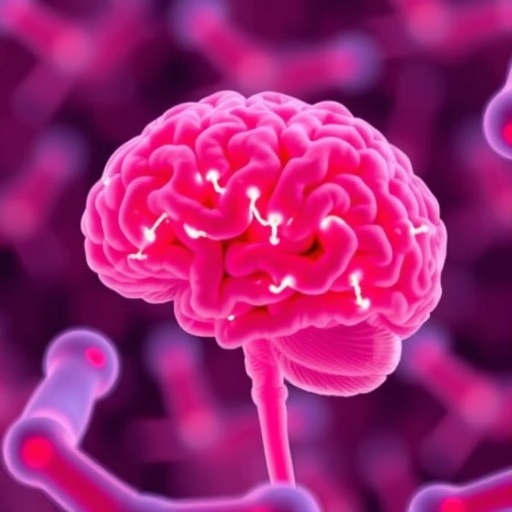In groundbreaking research that promises to revolutionize the early diagnosis and monitoring of Alzheimer’s disease (AD), scientists have successfully identified blood biomarkers that correspond to the progression of cognitive decline in community-based populations. This pivotal study, published recently in Nature Communications, ushers in a new era of accessibility and precision in the clinical management of Alzheimer’s, leveraging minimally invasive techniques that could supersede the need for more arduous cerebrospinal fluid sampling and costly brain imaging.
Alzheimer’s disease, the most common form of dementia, has long challenged researchers and clinicians with its insidious onset and complex clinical heterogeneity. Traditionally, diagnostic confirmation hinged upon neuroimaging modalities such as PET scans and invasive lumbar punctures to assess amyloid-beta and tau protein levels—hallmark pathological features of AD. The novel approach presented by Valletta, Vetrano, Gregorio, and colleagues marks a seismic shift by harnessing advanced blood assays that detect specific biomarkers reflective of neurodegeneration and pathological processes in real time.
The implications of such a blood-based assay are profound, particularly within epidemiological and community health settings. Historically, accurate staging of Alzheimer’s progression in non-clinical environments has been impeded by logistical constraints. The new biomarkers enable stratification of individuals along the cognitive spectrum—from subjective cognitive decline to mild cognitive impairment and full-blown dementia—thereby facilitating early intervention strategies well before irreversible brain damage accrues.
Technically, the researchers employed cutting-edge proteomic and metabolomic platforms, refined through algorithmic machine learning, to sift through vast biomarker candidates within peripheral blood samples. Their approach integrated markers of amyloid processing, tau phosphorylation, neuroinflammation, and synaptic health. This multiplex panel was then validated against parallel neuropsychological assessments and longitudinal cognitive performance measures, confirming its predictive robustness and clinical relevance.
The study’s longitudinal design is particularly noteworthy, encompassing diverse cohorts drawn from community dwelling older adults with varying degrees of cognitive function. This comprehensive framework allowed the team to delineate biomarker trajectories that correlate tightly with cognitive decline, rather than static snapshots. Crucially, these blood biomarkers not only affirmed the presence of AD pathology but also captured dynamic disease progression, offering unparalleled insights into the temporal evolution of the neurodegenerative cascade.
Understanding the pathophysiological underpinnings of Alzheimer’s through these circulating biomarkers also sheds light on the complex interplay between systemic and central nervous system processes. The detection of peripheral inflammatory markers alongside classical AD proteinopathies underscores a multifactorial dimension to disease progression, highlighting potential systemic therapeutic targets previously underappreciated in neurodegeneration research.
Moreover, the translational potential of these findings extends into public health policies and healthcare economics. Routine blood screening for Alzheimer’s biomarkers could become a cost-effective, scalable solution to screen large populations at risk, enabling healthcare systems worldwide to allocate resources more efficiently and prioritize individuals for targeted therapeutics and clinical trial enrollment. This democratization of diagnostic access may help bridge existing disparities in dementia care globally.
From a clinical trial perspective, having reliable blood biomarkers to monitor disease progression could streamline drug development pipelines. Future therapies that aim to halt or reverse cognitive decline will benefit enormously from clear, quantitative endpoints that are accessible and repeatable without patient discomfort. This facilitates not only better patient stratification but also real-time monitoring of treatment efficacy.
The researchers also highlighted the challenges and future directions in biomarker research. Although the current biomarkers perform admirably, refinement towards even greater specificity and sensitivity remains a key objective. Variability in biomarker expression due to demographic factors, comorbidities, and medication effects calls for further validation in broader and more diverse cohorts to ensure generalizability and clinical utility.
Technical innovation continues to play a central role in this field, with next-generation sequencing, ultra-sensitive immunoassays, and plasma phosphorylated tau quantification becoming indispensable tools. Integrating multimodal data including genetics, imaging, and longitudinal clinical evaluations will augment the predictive power of blood biomarkers, driving personalized medicine approaches tailored to individual risk profiles and disease trajectories.
The study’s community-centric approach also provides a blueprint for embedding biomarker testing within routine geriatric assessments, enabling proactive management strategies in primary care settings. This paradigm shift elevates preventative health, emphasizing early detection and lifestyle modifications alongside pharmacological interventions.
Importantly, ethical and psychosocial considerations accompany this technological leap. The prospect of early diagnosis through a simple blood test raises questions about counseling, informed consent, and the psychological impact on individuals with preclinical or prodromal disease states. Establishing protocols for disclosure and supportive care frameworks will be essential as blood biomarker testing moves toward mainstream adoption.
In conclusion, the work by Valletta and colleagues represents a landmark advance in Alzheimer’s research. By elucidating blood biomarkers that track disease progression across cognitive decline stages, they have opened a promising pathway towards early, non-invasive, and scalable diagnostics. This innovation heralds a future where Alzheimer’s disease can be detected and monitored with unprecedented ease, radically altering the landscape of dementia care with profound benefits for patients, caregivers, and healthcare systems worldwide.
Subject of Research: Blood biomarkers for Alzheimer’s disease and cognitive decline progression
Article Title: Blood biomarkers of Alzheimer’s disease and progression across different stages of cognitive decline in the community.
Article References:
Valletta, M., Vetrano, D.L., Gregorio, C. et al. Blood biomarkers of Alzheimer’s disease and progression across different stages of cognitive decline in the community. Nat Commun (2025). https://doi.org/10.1038/s41467-025-66728-2
Image Credits: AI Generated




